高中英语外研版必修3Module 3 Section Ⅲ Grammar — 过去完成时的被动语态和间接引语
高中英语第一篇教材Unit3课件外研版选择性必修第一册 161141

情境创设·语法精讲
单句填空
教材链接
1.(教材P26) Knowing (know) where the ball would go wasn't easy.
2.(教材P26) Shooting (shoot) with great accuracy was another thing he learnt.
3)It takes sb. sth. to do sth.句型 It took me two hours to finish the work.我完成那项工作用了两小时。
4)不定式和when/where/how/what/whether等连用,在句子中作主语。 How to solve the problem is still being discussed. 怎样解决这个问题仍在讨论中。 Where to put the box seems hard to decide. 看上去很难决定把这个箱子放在什么地方。
一、动名词作主语的几种情况 1.动名词直接置于句首。 Working in the conditions is not a pleasure but a pain. 在这样的条件下工作不是一件愉快的事而是一件痛苦的事。 2.v.-ing形式作主语,有时可以后置,用it作形式主语。 It is no use crying over spilt milk.覆水难收。 It is a waste of time persuading such a person to join us. 劝说这样的人加入我们真是浪费时间。
cheese producers and cities save money. 3.(2020江苏高考改编)Building such a bridge over the bay was (be) a
_新教材高中英语Unit3CONSERVTIONSectionⅢGrammar__定语从句学案
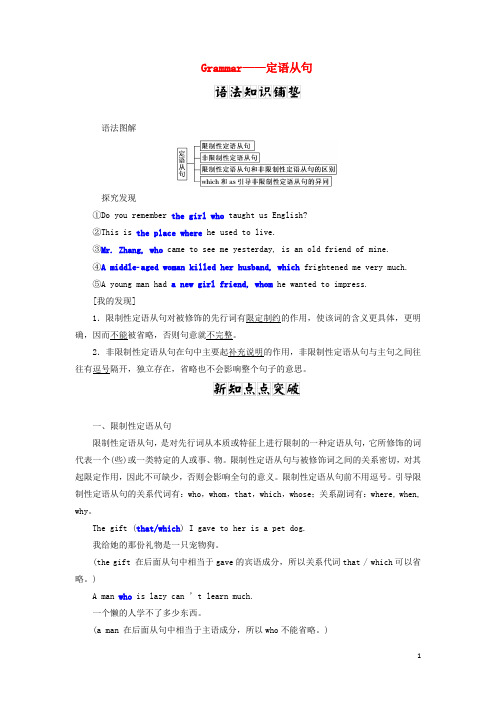
Grammar——定语从句语法图解探究发现①Do you remember the girl who taught us English?②This is the place where he used to live.③Mr. Zhang, who came to see me yesterday, is an old friend of mine.④A middleaged woman killed her husband, which frightened me very much.⑤A young man had a new girl friend, whom he wanted to impress.[我的发现]1.限制性定语从句对被修饰的先行词有限定制约的作用,使该词的含义更具体,更明确,因而不能被省略,否则句意就不完整。
2.非限制性定语从句在句中主要起补充说明的作用,非限制性定语从句与主句之间往往有逗号隔开,独立存在,省略也不会影响整个句子的意思。
一、限制性定语从句限制性定语从句,是对先行词从本质或特征上进行限制的一种定语从句,它所修饰的词代表一个(些)或一类特定的人或事、物。
限制性定语从句与被修饰词之间的关系密切,对其起限定作用,因此不可缺少,否则会影响全句的意义。
限制性定语从句前不用逗号。
引导限制性定语从句的关系代词有:who,whom,that,which,whose;关系副词有:where, when, why。
The gift (that/which) I gave to her is a pet dog.我给她的那份礼物是一只宠物狗。
(the gift 在后面从句中相当于gave的宾语成分,所以关系代词that / which可以省略。
)A man who is lazy can ’t learn much.一个懒的人学不了多少东西。
(a man 在后面从句中相当于主语成分,所以who不能省略。
高中英语新外研版精品教案《Grammar》3

Module 5 Great People and Great Inventions of Ancient ChinaThe Third Period Grammar 1Restrictive Attributive ClauseTeaching goals 教学目标Understand the definition and basic elements of the restrictive Attributive clauseFind out and conclude the usage of the relative pronoun and relative adverb by observingBe able to make a sentence using restrictive attributive clauseBe able to cooperate with each other when learningTeaching important points教学重点Find out and conclude the usage of the relative pronoun and relative adverb by observing Teaching difficult points教学难点Understand the usage of why. When, where correctly.Teaching methods教学方法a. Teach grammar in real situationsb. Learn grammar through practiceC. Learn grammar rules by observingTeaching aids教具准备A blackboardTeaching procedures & ways教学过程与方式Step 1 GreetingStep 2 Lead inplay a song named The Rose to arouse students' interest andlet them try to describe the singer's voice using some adjectives.Then lead them to find out the restrictive attributive clause in the lyrics.step 3 Introduce the basic elements of restrictive clause.Introduce the grammar rules to the students, such as the definition, the antecedentand the relative pronoun and relative adverb.Meanwhile, the teacher let the students to think about the relative pronouns and relative adverbs.step 4 Find out relative clauses in the passage " great philosophers of ancient China" we have learnt last class.Step 5 Fill in the blanks.Fill in the sentences about the three great philosophers .students are going to hands up quickly to fill in the blanks and get the points for their groupStep 6 Observe the groups of sentences and make a conclusion.Then fill in the chart.Group 11.Mozi(墨子)was another teacher who was very influential.2.Confucius was a philosopher who stressed the importance of kindness.3.Mencius was a great thinker who believed people are more important than rulers.Group21.Mozi(墨子)is a thinker who/whom People respect a lot.2.2.Confucius is a philosopherwho/whom every Chinese should know.3.Mencius was a great adviser who/whom the ruler valued most.Group31.Born in 476BC, Mozi came from a family which was very poor.2.Class 9 is the class which is so lively and united.3.Class 9 is the class which I like best.Group41.Mozi(墨子)was another teacher that was very influential.2.Class 9 is the class that is so lively and united.3.Mencius was a great adviser that the ruler valued most.4.Class 9 is the class that I like best.Group51.Mozi(墨子)was another teacher that/who was very influential.2.Class 9 is the class that/which is so lively and united.3.Mencius was a great adviser that /who/不填the ruler valued most.4.Class 9 is the class that / which/不填I like best.Group61.Mencius(孟子)was a thinker whose teachings were very similar to those of Confucius.2.Confucius(孔子)( 551BC --- 479BC ) is the philosopher whose influence has been the greatest.3.Mencius(孟子)was a thinker whose teachings were very similar to those of Confucius.4.The book whose name was Gone with the Wind is worth reading5.They live in a house Whose widows are broken.Group71.Ancient China was a palce where states were often at war with each other.2.But it was also a time when there were many great philosophers.3.The reason why man is different from animals is that man is good.Group8The room that I live in is very big.The room which I live in is very big.The room I live in is very big.The room where I live is very big.Group9The time that I spent with my friends was so unforgetable.The time Which I spent with my friends was so unforgetable.The time __/__ I spent with my friends was so unforgetable.The time when I play with may friends was so unforgetable.Group10I don't belive the reason that he told me.I don't belive the reason which he told me.I don't belive the reason which he told me.I don't belive the reason why he was late.Step 7 Practiceuse proper relative pronoun or relative adverb to fill in theblanks.The year 2021 is a time ________ we met in Class 9.Class 9 is a place ________ you can feel at home.A home is a place__________ will protect you forever .Vera is a teacher _________ teaching is very different from that of others'.The reason _______ Vera likes class 9 best is that the students are so lively and hard-working.Step 8 Making your own sentencesWork in groups and share the sentences in the class.step 9 Homeworkdescribe your group or class using restrictive attributive clause.。
高一英语必修3(外研版)1-3Grammar

Module 1 第3课时GrammarⅠ.用下列词的适当形式填空represent geography poor hungry continent locate agree where produce architect1.The company is________right in the centre of town.2.What are the main________features of North America according to this map?3.We have to get their________before we go ahead with the plan.4.There's________in all the places where the crop was flooded.5.________of computers has increased double in the last few years.6.The police are anxious to hear from anyone who may know the________of the firearms.7.The________United States does not include Hawaii.8.Her son is studying classical________and design in Rome.9.________prevented the boy from continuing his education.10.Our firm is________in India by Mr Hall.答案:1.located 2.geographical 3.agreement 4.hunger 5.Production 6.whereabouts 7.continental8.architecture9.Poverty10.representedⅡ.单项填空从题中所给的A、B、C、D四个选项中选出一个最佳答案。
英语外研版必修4课时作业 Module 3 Section Ⅲ Grammar
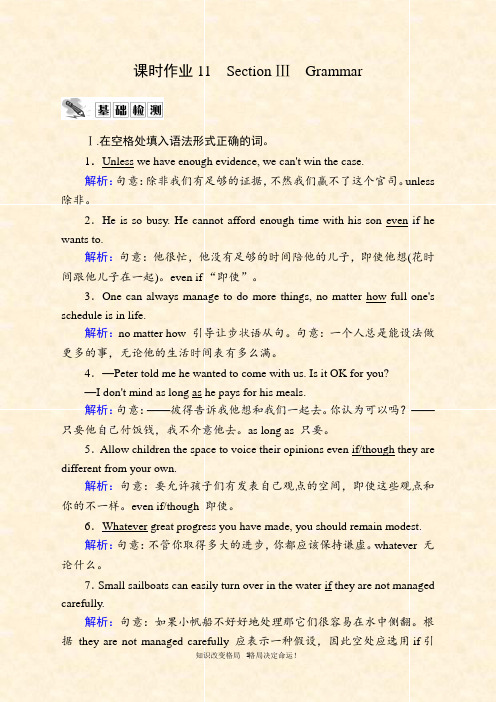
课时作业11Section ⅢGrammarⅠ.在空格处填入语法形式正确的词。
1.Unless we have enough evidence, we can't win the case.解析:句意:除非我们有足够的证据,不然我们赢不了这个官司。
unless 除非。
2.He is so busy. He cannot afford enough time with his son even if he wants to.解析:句意:他很忙,他没有足够的时间陪他的儿子,即使他想(花时间跟他儿子在一起)。
even if “即使”。
3.One can always manage to do more things, no matter how full one's schedule is in life.解析:no matter how 引导让步状语从句。
句意:一个人总是能设法做更多的事,无论他的生活时间表有多么满。
4.—Peter told me he wanted to come with us. Is it OK for you?—I don't mind as long as he pays for his meals.解析:句意:——彼得告诉我他想和我们一起去。
你认为可以吗?——只要他自己付饭钱,我不介意他去。
as long as 只要。
5.Allow children the space to voice their opinions even if/though they are different from your own.解析:句意:要允许孩子们有发表自己观点的空间,即使这些观点和你的不一样。
even if/though 即使。
6.Whatever great progress you have made, you should remain modest.解析:句意:不管你取得多大的进步,你都应该保持谦虚。
外研版高中英语必修三 Module3 Grammar(2) 教案-新版
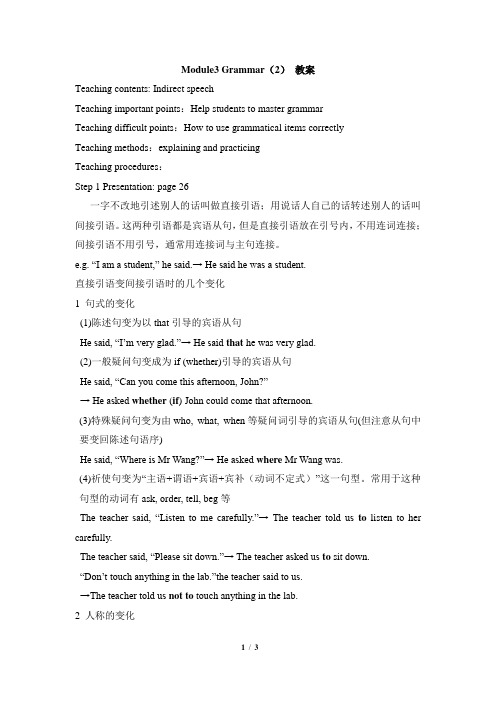
Module3 Grammar(2)教案Teaching contents: Indirect speechTeaching important points:Help students to master grammarTeaching difficult points:How to use grammatical items correctlyTeaching methods:explaining and practicingTeaching procedures:Step 1 Presentation: page 26一字不改地引述别人的话叫做直接引语;用说话人自己的话转述别人的话叫间接引语。
这两种引语都是宾语从句,但是直接引语放在引号内,不用连词连接;间接引语不用引号,通常用连接词与主句连接。
e.g. “I am a student,” he said.→ He said he was a student.直接引语变间接引语时的几个变化1 句式的变化(1)陈述句变为以that引导的宾语从句He said, “I’m very glad.”→ He said that he was very glad.(2)一般疑问句变成为if (whether)引导的宾语从句He said, “Can you come this afternoon, John?”→ He asked whether (if) John could come that afternoon.(3)特殊疑问句变为由who, what, when等疑问词引导的宾语从句(但注意从句中要变回陈述句语序)He said, “Where is Mr Wang?”→ He asked where Mr Wang was.(4)祈使句变为“主语+谓语+宾语+宾补(动词不定式)”这一句型。
常用于这种句型的动词有ask, order, tell, beg等The teacher said, “Listen to me carefully.”→ The teacher told us to listen to her carefully.The teacher said, “Please sit down.”→ The teacher asked us to sit down.“Don’t touch anything in the lab.”the teacher said to us.→The teacher told us not to touch anything in the lab.2 人称的变化I we you me us直接引语He\she they I him\her them 间接引语e.g. “Do you like English?” he asked me.→He asked me if (whether) I liked English.“I’ll help you with your maths, Wang Lin, ”Wei Fang said.→Wei Fang told Wang Lin that she would help him with his maths.“Are you going to see a film this evening?” Li Ping asked.→Li Ping asked if (whether) I was going to see a film that evening.3 时态的变化直接引语的时态间接引语的时态一般现在时一般过去时现在进行时过去进行时一般将来时过去将来时一般过去时过去完成时现在完成时过去完成时过去完成时过去完成时e.g. He said, “I’m using the knife.”→He said that he was using the knife.Zhou Lan said, “I’ll do my hmework after class.”→ Zhou Lan said that she would do her homework after class.提示:1当直接引语中的谓语动词为一般过去时时,如果与一个具体的表示过去时间的状语连用,变为间接引语时,时态可以不变。
高中英语Module2SectionⅢGrammar—表示转折关系和让步关系的连词课件外研版必修3

at all.
⑨You like playing tennis. I like reading. (while)
→ You like playing tennis, while I like reading.
Section Ⅲ Grammar — 表示转折关系和让步关系的连词 语法图解
探究发现
①Norway is at the top of the list, while the US is at number 7. ②Although developed countries give some financial help, they need to give much more. ③In the last ten years in China, 150 million people moved out of poverty. However, the challenges are still great. ④The report shows that we are making some progress but that we need to make greater efforts. ⑤You can do it however you like. ⑥While he is in poor health, he works hard. ⑦Young as/though he is, he knows a lot.
[我的发现] (1)由③④⑤句可知,but 是一个 连词 ,而 however 既可以用作 副词 ,也可以用作连词。 (2)②句 although 引导 让步状语 从句,可以与 though 互换。 (3) ⑥ 句中 while 引导让步状语从句,意为“虽然;尽管”, 而 ① 句中 while 表示对比或相反的情况,意为“然而”。 (4)⑦句中 as/though 引导让步状语从句,且句子采用了 倒装 语序,
高中英语Module3 SectionⅢGrammar_复习定语和定语从句课件外研版选修8
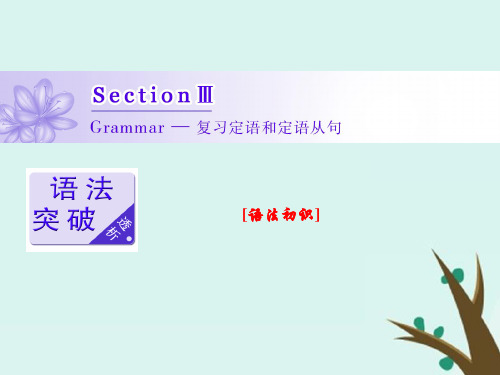
集中演练 2 (1)单句语法填空 ①Do you still remember the farm which/that we visited three months ago? ②—Is that the small town you often refer to? —Yes, just the one where I used to work for twenty years. ③Jim passed the driving test, which surprised everybody in the office.
Do you remember the day on which you joined our club?
你还记得你加入我们俱乐部的那一天吗? (2)“不定代词或数词+of+which/whom”引导的定 语从句可转化为“of+which/whom+不定代词或数词” 引导的定语从句。其中不定代词为:some, any, none, both, all, many, a few, few, a little, little, either, neither, one, most, part 等。
2.位置 定语的位置有两种:前置定语和后置定语。 (1)形容词作定语时要置于其修饰的名词前,但表语 形容词作后置定语;形容词修饰不定代词时也要后置。 All the people present were for the plan. 在场的所有人都同意这项计划。 There is something wrong with my watch. 我的手表出毛病了。
(2)用作定语的代词为形容词性物主代词、of 所有格 和不定代词所有格。
Her proposal is worth considering. 她的建议值得考虑。 My business is none of your business. 我的事与你无关。 (3)基数词和序数词都可用作定语。 We belong to the Third World. 我们属于第三世界。
高一英语必修3(外研版)3-3Grammar
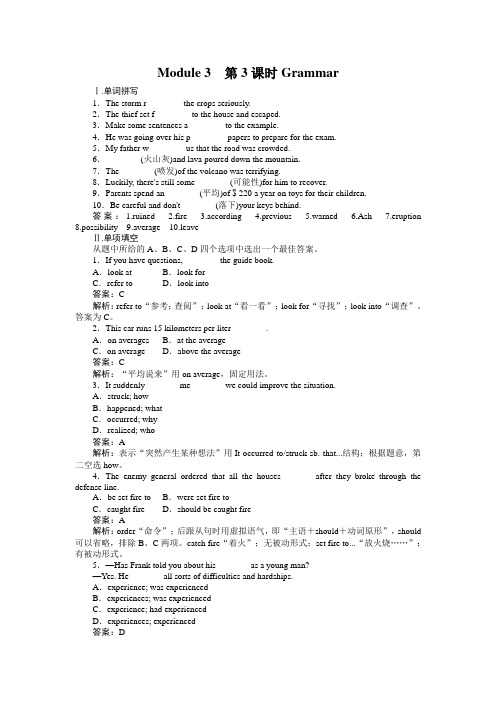
Module 3 第3课时GrammarⅠ.单词拼写1.The storm r________ the crops seriously.2.The thief set f________ to the house and escaped.3.Make some sentences a________ to the example.4.He was going over his p________ papers to prepare for the exam.5.My father w________ us that the road was crowded.6.________(火山灰)and lava poured down the mountain.7.The________(喷发)of the volcano was terrifying.8.Luckily, there's still some________(可能性)for him to recover.9.Parents spend an________(平均)of $ 220 a year on toys for their children.10.Be careful and don't________(落下)your keys behind.答案:1.ruined 2.fire 3.according 4.previous 5.warned 6.Ash7.eruption 8.possibility9.average10.leaveⅡ.单项填空从题中所给的A、B、C、D四个选项中选出一个最佳答案。
1.If you have questions, ________the guide book.A.look at B.look forC.refer to D.look into答案:C解析:refer to“参考;查阅”;look at“看一看”;look for“寻找”;look into“调查”。
【同步练习】2017年秋外研版必修3 Module3 Period 3课时提升作业含解析

课时提升作业八Module 3GrammarⅠ. 把下列句子改为被动语态1. He had broken his arm when I saw him.2. Lucy had already completed the project when I arrived.3. I had sold out the ticket when she came.4. They began to climb the mountain after they had bought all the food and drinks.5. I had turned off all the lights before I went to bed.答案:1. When I saw him his arm had been broken.2. When I arrived the project had already been completed.3. When she came the ticket had been sold out.4. They began to climb the mountain after all the food and drinks had been bought.5. All the lights had been turned off before I went to bed.Ⅱ. 把下列句子改为间接引语1. “I don’t think I will be able to finish it in time, ”Mike said.2. “It’s the most interesting film I’ve ever seen, ”he told his friend.3. The doctor said, “The man has hurt his leg rather badly. ”4. My mother said, “Have your rotten tooth been pulled out?”5. “How will you go to the park?”Brown said to his younger brother.6. “We’ve lived there for two years, ”he told me.7. “I was here a few weeks ago, ”she said.8. Wang Jun said, “I was studying when I saw the UFO outside the window. ”9. “Light travels much faster than sound. ”he said.10. “Don’t make so much noise, children!”she said.答案:1. Mike said that he didn’t think he would be able to finish it in time.2. He told his friend that it was the most interesting film he had ever seen.3. The doctor said that the man had hurt his leg rather badly.4. My mother asked if my rotten tooth had been pulled out.5. Brown asked his younger brother how he would go to the park.6. He told me that they had lived there for two years.7. She said that she had been there a few weeks before.8. Wang Jun said he was studying when he saw the UFO outside the window.9. He said that light travels much faster than sound.10. She told the children not to make so much noise.Ⅲ. 完形填空Last Sunday I saw the worst storm in years. It1suddenly inthe mid-afternoon and2more than three hours.At first, the sky grew3all of a sudden within minutes, forks of lightning forced a way into the sky. Then it was4by the boom-boom-boom of5. A very strong wind blew into my room. My valuable notes, 6on my desk in the room, 7high into the air. I jumped up to8them but unluckily a few sheets9out of the open window. 10I ran out to get the notes, big drops of rain began to 11.As soon as I ran back into the house, the12began to pour inwaves. I13to close the windows. I did it but was wet all over. I14 myself with a towel. Then I heard a sudden loud15from the back of the house. I ran out of the room to16what it was. A tree was broken. Part of its big branch lay17the floor. The table was18into pieces. It would19 a lot of work to rebuild it. However, we were20that no one was hurt.【文章大意】本文是一篇记叙文, 叙述了“我”经历过的一场暴风雨的情况。
高中英语 Module 3 Music Section Ⅲ Grammar——时间状语从句
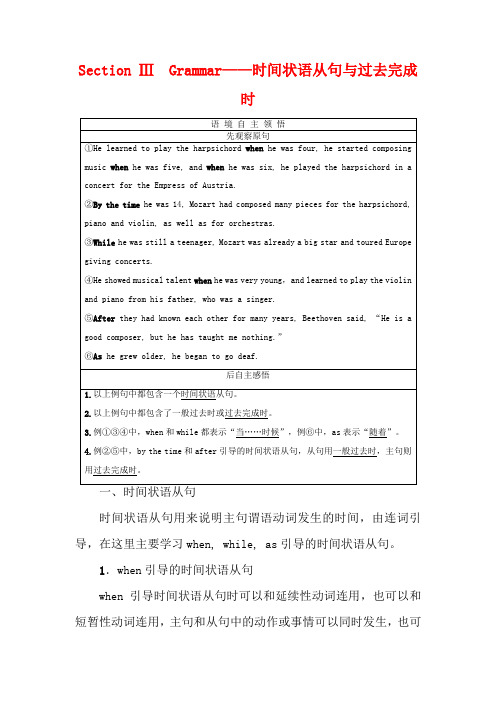
Section ⅢGrammar——时间状语从句与过去完成时时间状语从句用来说明主句谓语动词发生的时间,由连词引导,在这里主要学习when, while, as引导的时间状语从句。
1.when引导的时间状语从句when引导时间状语从句时可以和延续性动词连用,也可以和短暂性动词连用,主句和从句中的动作或事情可以同时发生,也可以先后发生。
When they heard the bad news, they were very surprised.当他们听到那个坏消息时,他们非常惊讶。
When I was walking down the street, I saw some old friends.当我沿着那条街走时,我看到了一些老朋友。
[名师点津]when可用作并列连词,意为“这时,那时”,相当于and at this/that time。
常用于:(1)was/were doing sth. when...正在做……这时……(2)be about to do sth./on the point of doing sth. when...正要做……这时……(3)had(not) just done sth. when...刚做完……这时……I was watching TV when someone knocked at the door.我正在看电视,这时突然有人敲门。
I was about to go to bed when he called me up.我正要上床睡觉的时候,他打电话来了。
2.while引导的时间状语从句while引导时间状语从句时,意为“当……的时候”,从句的谓语动词必须是延续性动词。
强调主句和从句的动作同时发生或相互对应。
While the child was playing with his toys, his parentswere watching TV.当那个孩子玩玩具时,他父母在看电视。
高一英语必修3(外研版)课件1-3 Grammar
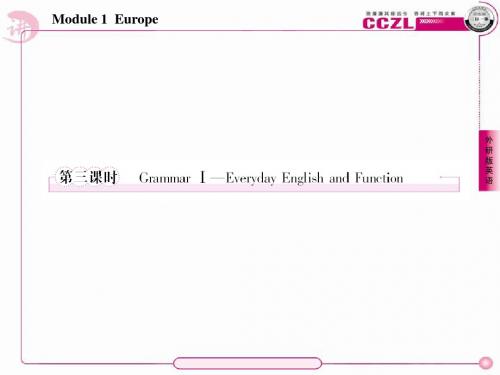
Module 1 Europe
即学即用
Our bodies are strengthened by working out. ________, our minds are developed by learning. A.Likely C.Probably 答案:B B.Similarly D.Therefore
外 研 版 英 语
Module 1 Europe
高考直击
(1)(2008·湖南)—When did you last hear________Jay? —He phoned me this morning, and we
外 研 版 英 语
agreed________a time and place to meet. A.of, to C.from, with B.about, with D.from, on
外 研 版 英 语
Module 1 Europe
词语辨析
opposite与contrary都表示“相反的”。 1)opposite指位置、方向、地位、性质、意义等“对立 的,相反的”。 “True”and“false”have opposite meanings. “真”与“假”有着相反的意思。 2)contrary指“两物朝相反的方向发展”,含有“互 相冲突;不一致”的意思。
外 研 版 英 语
我们赞成早些开始。
Module 1 Europe
(4)agree on就„„取得一致意见;在„„方面双方达
成协议 We finally agreed on a price for the house. 我们最后商定了房子的价格。 (5)agree that... 同意„„ We agreed that we ought to work hard. 我们同意要认真工作。
高中英语Module3SectionⅢGrammar_动词_ing形式的完成式作状语及动词_ing形式与不定式作宾语外研版选修6

Section Ⅲ Grammar—动词-ing形式的完成式作状语及动词-ing形式与不定式作宾语[语法初识]1(1)基本形式:having+过去分词否定形式:not having+过去分词完成式的被动式:having been+过去分词(2)成分:动词ing形式的完成式在句中可作状语,常表示时间、原因等。
(3)功能:所表示的动作发生在谓语动作之前,如果该动作与句子的主语之间是主谓关系,则用主动形式having done;如果是动宾关系,则用被动形式having been done。
Having lived in the city for three years, she knows it well.在这个城市生活了三年,她对这里已经很熟悉了。
Not having finished the homework, the pupil doesn’t dare to go to school.由于还没有完成作业,这个学生不敢去上学。
Having been invited to speak, I’ll start making preparations tomorrow.已经被邀请发表讲话,我明天将开始做些准备。
2.动词ing形式的一般式和完成式作状语的用法区别(1)动词ing形式的一般式,作状语时与句子主语之间为主动关系,所表示的动作与句子谓语动作同时或几乎同时发生,常表示时间、条件、原因或结果等。
Seeing those pictures, he couldn’t help thinking of those days in Yan’an.当他看到那些图片时,就禁不住想起了在延安的那些日子。
Working hard, you will pass the entrance exam.如果你努力学习,你就会通过入学考试。
(2)动词ing形式的完成式,作状语时与句子主语为主动或被动关系,所表示的动作发生在谓语动作之前,常表示时间或原因等。
18-19 Unit 3 Section Ⅲ Grammar——定语从句(Ⅲ)和反意疑问句

18-19 Unit 3 Section ⅢGrammar——定语从句(Ⅲ)和反意疑问句引导词(关系词) 先行词在定语从句中作的成分关系代词who 人主语whom 人宾语关系代词which 物/整个主句的意思主语/宾语whose(=ofwhom或ofwhich)人/物定语as 人/物/整个主句主语/宾语关系副词when 时间名词时间状语where 通常是地点名词地点状语查尔斯·史密斯去年退休了,他曾是我的老师。
Xiao Wang,whom they often talk about,is going to America next month.(宾语)他们经常谈到的那个小王下个月要去美国了。
There are many high buildings along the river,where there used to stand rows of trees.(地点状语)沿河有很多的高楼,过去那儿是成排的树。
In his office there are nine clerks,the youngest of whom is Mr.Liu.(介词宾语)他办公室有9个职员,其中最年轻的是刘先生。
The earth goes around the sun,as we all know.(宾语)众所周知,地球绕着太阳转。
[名师点津](1)在非限制性定语从句中不能用that来代指人或物,而应当用who/whom 指人,用which指物。
指人和指物的关系代词在非限制性定语从句中作宾语时也不能省略。
指人作宾语时只能用宾格whom,不能用who替换。
(2)非限制性定语从句不能用why引导,常用for which代替why。
[即时演练1]用适当的关系词填空①China Today attracts a worldwide readership,which shows that more and more people all over the world want to learn about China.②The books on the desk,whose covers are shiny,are prizes for us.③John invited about 40 people to his wedding,most of whom are family members.3.as和which引导非限制性定语从句的区别as,which引导非限制性定语从句指代整个句子引导词as which位置可位于主句之前、之中或之后引导的从句不能位于主句之前意义正如这,那功能连接上下文的作用,表达说话人的观点、看法,并指出主句内容引导的从句在意义上相当于一个并列句正如今天的报纸上说的,我们必须改进工作作风。
高中英语必修三教师用书:Unit 3 Section ⅢGrammar—宾语从句和表语从句 含答案
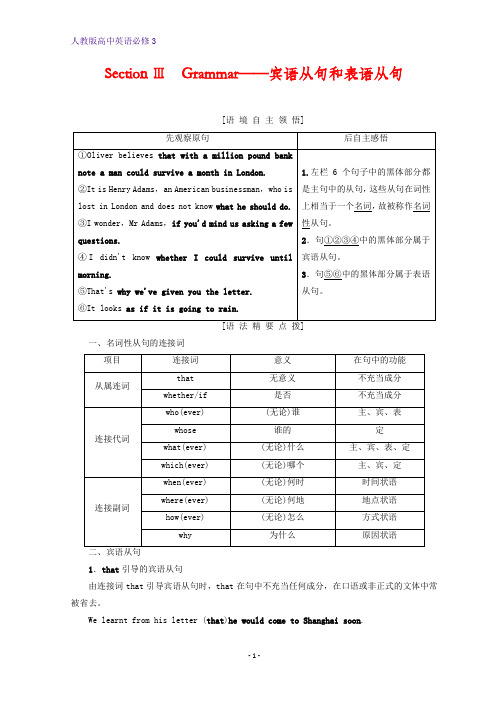
Section ⅢGrammar——宾语从句和表语从句[语境自主领悟]一、名词性从句的连接词1.that引导的宾语从句由连接词that引导宾语从句时,that在句中不充当任何成分,在口语或非正式的文体中常被省去。
We learnt from his letter (that)he would come to Shanghai soon.从他的信中我们了解到他不久会来上海。
[名师点津]宾语从句中两种情况中的连接词that不能省略;①引导的第二个宾语从句前的that不可省;②在动词+形式宾语it+宾语补足语+that引导的宾语从句中that不能省略。
He said(that)you were too young to understand the matter and that you were asked not to care about it.他说你太年轻,还无法理解这件事情,你也不要去管它。
We think it important that every citizen should obey the traffic rules.我们认为每个市民都应该遵守交通规则是很重要的。
[即时训练1]单句改错①He said he would give up the chance and he would try hard to look for another one.在and后加that②We found it strange no one would take the money.在strange后加that2.whether或if引导的宾语从句whether或if引导宾语从句时,在句中不充当成分,但是含“是否”之意,从句要用陈述语序。
I wonder whether/if we'll finish the task on time.我不知道我们能否按时完成这项任务。
I'll see whether/if I can advise him to accept it.我要看看我是否能劝他接受。
- 1、下载文档前请自行甄别文档内容的完整性,平台不提供额外的编辑、内容补充、找答案等附加服务。
- 2、"仅部分预览"的文档,不可在线预览部分如存在完整性等问题,可反馈申请退款(可完整预览的文档不适用该条件!)。
- 3、如文档侵犯您的权益,请联系客服反馈,我们会尽快为您处理(人工客服工作时间:9:00-18:30)。
It was the third time that he had been beaten black and blue. 那是他第三次被打得青一块紫一块的。 (4)在虚拟语气中,条件句表示与过去事实相反,且主语与谓 语构成动宾关系时,要用过去完成时的被动语态。 If I had been invited earlier, I would have gone there. 如果早点儿邀请我的话,我就去那儿了。
[我的发现] (1)②句采用了过去完成时,其构成形式为: 主语+had done 。 (2)①③句采用了过去完成时的被动语态,其构成形式为: 主语+
had been done 。 _______________
(3)④~⑦句均为直接引语变间接引语的句子,在变间接引语时,
人称 、 时态 、 语序 等方面都要做相应的变化。 _____
ction_Ⅲ
Grammar —过去完成时的被动语态 和间接引语
语法图解
探究发现 ①By the time it ended, more than 700 people had been killed and 2,700 had been injured. ②By the late 1890s, he had moved to Galveston, where he died in 1899, a year before the hurricane struck. ③Coghlan traveled back to Canada — after he had been buried in Texas! ④She says, “Tom was very kind.” →She says that Tom was very kind.
Paris.
(2)before, when, by the time, until, after, once 等引导的时间 状语从句的谓语是一般过去时,以及 by, before 后面接过去的时 间时,主句动作发生在从句的动作或过去的时间之前且表示被动 时,要用过去完成时的被动语态。
By the time she was 13, my sister had been sent to America. 我姐姐 13 岁前就已经被送到美国了。 200 cars had been produced by the end of last year. 到去年年底,已经生产了 200 辆汽车。 (3) It was the first/second ... time that ...句中 that 引导的 定语从句中,主语与谓语构成动宾关系时,要用过去完成时 的被动的语态。
(2)完成句子 ①His newly written novel had been translated into English by the end of last month. 上个月末,他刚写的小说已被翻译成了英语。 ②Her homework
[即时演练 2] (1)用所给词的适当形式填空 ①By the end of last year, 10,000 trees had been planted (plant) in that village. ②His village had been flooded (flood) in the heavy rain, so he moved to his parents’ house. ③He found that his wallet had been stolen (steal) on the bus. ④It was the second time that Tom had been punished (punish) so seriously.
(4)由⑦句可知, 若直接引语为客观真理, 变间接引语时, 时态 不变 。
一、过去完成时的被动语态 1.概念:过去完成时的被动语态表示动作在过去某一时刻 或某一动作之前已完成,且主语与谓语动词存在被动关系。 2.构成 (1)肯定结构:主语+had been done (2)否定结构:主语+had not been done
Had+主语+been done ... (3)疑问句结构: 特殊疑问词+had+主语+been
done
3.用法 (1)在 told, said, knew, heard, thought, found 等动词后的宾语 从句中,表示宾语从句中的动作已被做完时,要用过去完成时的 被动语态。 He heard that the tickets had already been sold out. 他听说票已售完。 The newspaper reported more than 1,000 people had been killed in the hurricane. 报纸报道说有一千多人在飓风中丧生。
[即时演练 1]
完成句子 by her boss.
①She told me that she had been dismissed 她告诉我,她的老板已把她解雇(dismiss)了。
②He said (that) he had never been shown around 他说从来没有人领他参观过巴黎。
⑤He asked, “Will you go to the party?” →He asked whether/if I would go to the party. ⑥She asked me, “When do they have their dinner?” →She asked me when they had their dinner. ⑦The teacher said, “About 70% of the earth’ s surface is covered with water.” →The teacher said that about 70% of the earth’s surface is covered with water.
